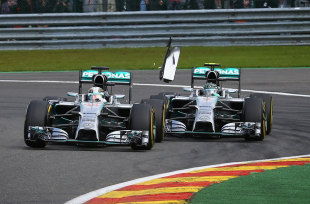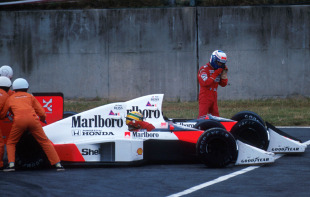
It's interesting to read Alain Prost's comments on the state of play at Mercedes. Prost is in the unique position of being able to appreciate the nuances from every angle; he was at war with Ayrton Senna to the point where he felt he had to make a stand; on a happier note, he was able to win the 1986 championship at the eleventh hour as Nigel Mansell and Nelson Piquet took points off each other during an increasingly bitter in-house battle at Williams.
The four-time world champion had this to say about the implications of what he described as "a racing incident" on the second-lap at Spa.
"You have to remember that from the cockpit you can't see your big front wing, and every weekend we see two or three incidents just like it," Prost told f1news.ru. "Lewis did not want to leave him more space and Nico didn't want to leave the track and perhaps made a small mistake in assessing the situation. But he didn't do it intentionally because the chance is much higher that you only damage your own car. Of course, the consequences were very serious for Lewis, but it was still a racing incident, albeit inflamed by the media and the fans, and even the team."
The whys and wherefores of the actual collision have been hashed and dished on every forum worthy of the name, so let's take a look at Prost's final sentence, starting with "media".
About an hour after the race, I was sitting in the media centre at Spa when the British newspaper correspondents returned from a briefing with Lewis Hamilton. To say they had a spring in their step would be like suggesting Washington Post journalists Woodward and Bernstein were reasonably pleased about uncovering Watergate.
Lewis had dropped a red-hot story into their laps by blurting out the detail of the team's post-race briefing; specifically what Nico Rosberg had "basically" said. The fine detail of how it was said or what Rosberg actually meant about "making a point" gets lost in situations where a journalist - and, more important, his or her sports editor - is looking for story. The writer may have niggling doubts but, when you see a tabloid journalist on the other side of the room beating six bells out of his keyboard, you know there is only going to be one hugely dramatic theme and you'd better get on with your contribution.
Whether or not Lewis realised that is a moot point. Did he understand the psyche of his audience outside that meeting room? Or was this a typically emotional knee-jerk reaction from the Englishman? Probably a bit of both.
Whatever the motive, this story had taken on a significant new dimension. Regardless of how that was portrayed - and some of the headlines were predictably over the top - it's rather missing the point to shoot the messenger.

It's worth adding that if Lewis thought Nico was an easy touch - as in Bahrain and Hungary - he now has second thoughts going into the final seven races. Which was perhaps the thrust - no pun intended - of the message at Les Combes. If that's the case, it's interesting that Rosberg was only marginally less clumsy than Prost when Alain made his exasperated point by trying to stop Ayrton overtaking in the closing stages of the 1989 Japanese Grand Prix.
I'm not entirely sure what Prost means when mentioning "the fans". If he is referring to the booing at the podium, he has a point because of the moment's global transmission and influence on the wider audience. I was in agreement with the booing after Ferrari's stage-managing of the 2002 Austrian Grand Prix; more so in the event of F1's disgraceful handling of the 2005 US Grand Prix. But I'm not so comfortable with such a display by fans when their only evidence is a couple of re-runs of the clash on giant TV screens.
Prost makes the most interesting point of all when referring to the team's influence. There are opposing views here. David Coulthard, having been snared by team orders at McLaren, feels the Mercedes bosses are in a no-win situation. "You cannot manage the unmanageable…the rivalry has become just that," says Coulthard in his excellent Daily Telegraph column .
On the other hand, John Watson firmly blames weak management, the five-time F1 winner referring to Toto Wolff, Paddy Lowe and his former Brabham team mate Niki Lauda as "The Three Stooges", the implication being that the Mercedes bosses are no better than the vaudeville comics. Watson says the team desperately misses the soft but immensely authoritarian voice of Ross Brawn.
I agree with both DC and Wattie. There is no doubt that the instructions/orders/suggestions/whatever in Hungary could have been delivered in a more unambiguous manner and avoided the ill-feeling Rosberg carried with him to Spa. It also creates a poor impression when Wolff steps in front of the cameras and, before speaking, asks: "What has Niki said?" There has got to be a certain truth and anxiety behind Wolff's tongue-in-cheek question when Lauda - much as I love his directness - shoots from the lip and appears to contradict other team members.
The Mercedes policy of allowing their drivers to go racing is one to be admired but the time has now come for some sort of order. Once the domestic dispute had been dealt with at Spa on Sunday, I wonder how long it took the Mercedes management to spot that Daniel Ricciardo, after looking after older tyres and fending off Rosberg, had enough in hand to save his fastest race lap until the very end. A class act. Much the same, you could say, as any of Alain Prost's four crucial wins in 1986.
Maurice Hamilton writes for ESPN F1.
© ESPN Sports Media Ltd.
 Maurice Hamilton writes for ESPN F1. A veteran journalist in the paddock, Maurice Hamilton has been part of the Formula One scene since 1977 and was the Observer's motor racing correspondent for 20 years. He has written several books as well as commentating on Formula One for BBC Radio 5 Live
Maurice Hamilton writes for ESPN F1. A veteran journalist in the paddock, Maurice Hamilton has been part of the Formula One scene since 1977 and was the Observer's motor racing correspondent for 20 years. He has written several books as well as commentating on Formula One for BBC Radio 5 Live

